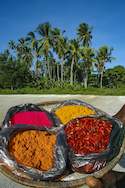
Even those people who've only dreamed of visiting Zanzibar have usually heard its nickname 'The Spice Island'. Just the word conjures up heady, exotic aromas and rich, exciting flavours. But for those who like hard facts to go with their romantic fantasies, here's a rundown of Zanzibar's spice heritage in more detail:
What are spices?
Spices are best described as the dried parts of aromatic plants whose qualities are perceived through smell and taste. As well as their more obvious function in flavouring food, spices have a profound effect on health, affecting many functional processes of the body. Because they act as anti-oxidants, they are essential in the preservation of foods.
The History of Spice
The use of spices is almost as old as human history itself. As far back as 2600BC, there are records of the Egyptians feeding spices obtained from Asia to labourers building the great pyramid of Cheops, to give them strength. Long before the 6th century BC, when Confucius advocated the use of ginger, the Chinese were obtaining spices from the tropics. Europe imported them before Rome was founded.
As the Portuguese conqueror Vasco da Gama's men came ashore in Western India in the 15th century, their battle cry was,"For Christ and spices!" Spices were the first luxury goods to appear in the European economy. Plants such as pepper, cinnamon, ginger and nutmeg grew naturally only in the tropics - principally the islands of the Indonesian archipelago and the coastal regions of India.
Such places were, to the Europeans of the middle ages, as remote as the reaches of outer space. The use of spices as seasonings in food was a status symbol - the exotic nature of spices, only obtainable in far-off, unknown lands, was an emblem of the wealth and prestige of anyone who could afford to use them.
This symbolic value appears also in the use of spices beyond meals and banquets. They were presented as gifts of state, and were bequeathed in wills together with other heirlooms. Rents and debts could even be paid in spices rather than gold.
The hunger for spices in Europe led to desperate and brutal competition between the major trading powers to control the shipping routes that brought spices to their markets. Dutch, Portuguese, English and Spanish governments dispatched intrepid merchant companies to the Far East in search of the elusive source of the spices for which their citizens were clamouring.
Many never returned, shipwrecked, lost or murdered in the unknown, uncharted waters of the world's oceans. But eventually, the European powers gained control of the production of spices, obtaining the spice plantations of the Far East by simple force, and wresting domination of the spice trade from the Arabic merchants who had been supplying spices to the rest of the world for centuries before.
Once the European merchants gained a toehold in the Indies, the home of the most valuable spices, they attempted to establish a monopoly, punishing by death anyone who attempted to smuggle seeds or plants off their remote island plantations. But even these desperate tactics were useless in the face of the demand for spices - daring international spice pirates stole the plants (nutmeg, cinnamon or cloves) and replanted them in far-off locations, breaking the monopoly and ensuring the freedom of the spice trade forever.
Spices in Zanzibar
Since ancient times, a flourishing sea-going trade has existed between the nations surrounding the Indian Ocean. Goods from Indonesia, Malaysia and India have been arriving on the coast of East Africa for centuries, borne on wooden dhows sailing the monsoon winds that blow across this region. It is certain that spices from Asia arrived in Zanzibar this way long before the dawn of the European spice merchants.
Early in the sixteenth century Portuguese traders established a base on Zanzibar as part of their plan to control East Africa. They imported various plants, including spices, from their colonies in South America and India. Land was cleared for plantations, but the Portuguese never really developed their presence on Zanzibar beyond a military one.
It was left to the Omani Arabs, who ruled Zanzibar from the early eighteenth century, to develop Zanzibar economically as a spice-producing entity. Sultan Seyyid Said, the first Omani sultan to govern Zanzibar, quickly realised the potential of his new dominion, with its hot climate and regular rainfall, as a location for spice farming.
He encouraged in particular the planting of clove trees on his own plantations, and issued a decree to other landowners that for each coconut tree on their farms, two clove trees must be planted. Soon Zanzibar had become a major producer of spices. With the demise of the slave trade in the late nineteenth century, spices became Zanzibar's main source of income.
When the era of the Sultans ended and the long arm of the British Empire reached Zanzibar, the islands new colonial 'protectors' encouraged the farming of spices and other useful plants, bringing in European scientists to found experimental agricultural stations and government farms such as those at Kizimbani and Kindichi. Today these areas still contain spice plantations controlled by the modern, independent Tanzanian government.
But spices in Zanzibar today are by no means simply the preserve of governments keen to produce cash-rich export products or a useful tourist attraction. For the ordinary people of Zanzibar, spices and useful plants are a vital part of everyday life and a rich element in the island's strong and vibrant culture.
The spices grown in village kitchen gardens give their flavour to the distinctive cuisine of Zanzibar, provide innumerable cures for everyday ailments, and yield the dyes and cosmetic products needed to celebrate weddings and festivals.
From the dark-red stain of henna on a bride's hands, to the coconut-palm roof of a newly-constructed house, or the sweet aroma of cloves drying in the sun, spices and useful plants are woven into the fabric of life and culture of these fascinating islands. Touch, taste and smell the spices that grow here, and you'll be on your way to understanding the true nature of Zanzibar.
A Spice Tour

Sooner or later every visitor to Zanzibar will be offered a 'spice tour' - a trip to the farmlands just outside Stone Town to see aromatic plants and herbs growing wild or cultivated in kitchen gardens.
Even if you usually shy away from obviously organised or 'touristy' activities, a spice tour is probably the best way of seeing the countryside around Stone Town and meeting rural communities.
Guides take you on a walking tour of the villages and plantations at Kizimbani or Kindichi, picking bunches of leaves, fruit and twigs from bushes and inviting you to smell or taste them to guess what they are. Pretty much all the ingredients of the average kitchen spice rack are represented - cinnamon, turmeric, ginger, garlic, chillies, black pepper, nutmeg and vanilla among many others.
Alongside the spices grow a mouthwatering array of fruits, which depending on season will include pineapple, mango, jackfruit, lychees, bananas, papaya and the notoriously smelly Durian fruit ('smells like hell, tastes like heaven'). All these are available to be feasted on as you walk around the plantations.
During your tour, local children follow you all the way round, making baskets of palm leaves and filling them with flowers to give to you. At lunchtime, you'll stop in a local house for a meal of pilau rice and curry, followed by sweet Arabic coffee and perhaps a slice of lemongrass cake.
Many spice tours include a visit to the Persian baths built by Sultan Said for his harem, and stop at Fuji or Mangapwani beaches just outside Stone Town for a swim on the way back.
Practicalities
A tour with a private guide is more rewarding but more expensive. The most highly recommended of Zanzibar's spice tour guides is Hisdory Jumane, an ebullient young man who grew up in a family steeped in Zanzibar's traditions of spice agriculture.
Copyright © Gemma Pitcher 2004

 How would you like your meal, sir. Reclining on a cushion and gazing over the rooftops of the ancient Stone Town....
How would you like your meal, sir. Reclining on a cushion and gazing over the rooftops of the ancient Stone Town.... Zanzibar is actually the name given to a cluster of islands that nestle in the waters of the Indian Ocean just off the coast of mainland Tan...
Zanzibar is actually the name given to a cluster of islands that nestle in the waters of the Indian Ocean just off the coast of mainland Tan...